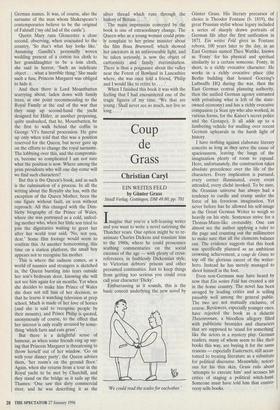Coup de Grass
Christian Caryl
EIN WEITES FELD by Gunter Grass
Steidl Verlag, Gottingen, DM 49.80, pp. 781 Imagine that you're a left-leaning writer and you want to write a novel satirising the Thatcher years. One option might be to re- animate Charles Dickens and translate him to the 1980s, where he could pronounce scathing commentaries on the social excesses of the age — with plenty of cross- references, in faultlessly Dickensian style, to Victorian debtors' prisons and other presumed continuities. Just to keep things from getting too serious you could even call your character 'Dicky'.
Embarrassing as it sounds, this is the basic conceit underlying the new novel by `We could read the scales for eachother.' Giinter Grass. His literary precursor of choice is Theodor Fontane (b. 1819), the great Prussian stylist whose legacy included a series of sharply drawn portraits of German life after the first unification in 1871. EM weites Feld gives us Fontane reborn, 100 years later to the day, in an East German named Theo Wuttke, known as `Fonty' for his physical and spiritual similarity to a certain someone. Fonty, in short, is a richly evocative character. He works in a richly evocative place (the Berlin building that housed Goering's Luftwaffe HQ during the war, then the East German central planning authority, then the unified German agency entrusted with privatising what is left of the state- owned economy) and has a richly evocative companion (a Stasi spy who also worked, in various forms, for the Kaiser's secret police and the Gestapo). It all adds up to a lumbering vehicle for mulling over recent German upheavals in the harsh light of history.
I have nothing against elaborate literary conceits as long as they serve the cause of spaciousness, leaving the lungs of the imagination plenty of room to expand. Here, unfortunately, the construction takes absolute precedence over the life of the characters. Every implication is pursued, every corner illuminated, every event attended, every cliché invoked. To be sure, the Grassian universe has always had a tendency to curdle and cramp under the force of his ferocious imagination. Yet never before has he allowed his self-image as the Great German Writer to weigh so heavily on his style. Sentences strive for a Thomas-Mann-like orotundity. One can almost see the author applying a ruler to the page and counting out the millimetres to make sure that all the elements balance out. The evidence suggests that this book was specifically planned as an ambitious crowning achievement, a coup de Grass to top off the glorious career of the writer- hero. Instead he has merely managed to shoot himself in the foot.
Even non-Germans may have heard by now that Ein weites Feld has created a stir in the home country. The novel has been savaged by leading critics and is selling passably well among the general public. The two are not mutually exclusive, of course. Reviewers, especially younger ones, have rejected the book as a didactic Thesenroman, a bloodless allegory filled with publicistic bromides and characters that are supposed to 'stand for something' like the actors in a mystery play. German readers, many of whom seem to like their books this way, are buying it for the same reasons — especially Easterners, still accus- tomed to treating literature as a substitute for political discourse. Meanwhile, notori- ous for his thin skin, Grass rails about `attempts to execute him' and accuses his critics of staging a political witch-hunt. Someone must have told him that contro- versy sells books.


























































 Previous page
Previous page